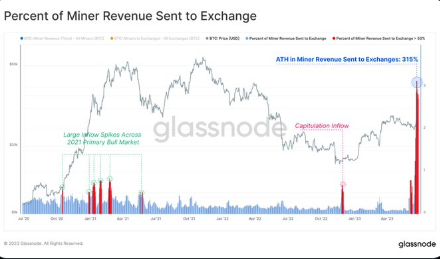In the world of Bitcoin mining, the concept of decentralization versus centralization has been a subject of ongoing debate.
Recent data from Hash Index has shed new light on this discussion by revealing that public miners make up just 28% of Bitcoin’s global hash rate. This statistic challenges the notion that miners hold central control over the network, emphasizing the pivotal role of nodes in the ecosystem.
While this data showcases the influence of public miners, it’s crucial to acknowledge that potential centralization points still exist within mining pools. Approximately 70% of the network’s hash rate is driven by private entities, as reported by Hashrate Index.
According to @hashindex, public miners are 28% of #Bitcoin‘s global hashrate.
The industry is evolving, with public co’s and nation-states now integrally involved. This presents opportunities & challenges to the network.
1/ pic.twitter.com/S6bFNTknMO— Jamie Coutts CMT (@Jamie1Coutts) September 27, 2023
Mining Pools And Decentralization
Decentralization, in the context of crypto mining, refers to the distribution of computational power and decision-making across a diverse network of participants. When discussing mining pools, decentralization becomes a critical concern. Mining pools are groups of miners who combine their computational resources to increase their chances of successfully mining a Bitcoin block.
However, the concentration of hash power within these pools can potentially introduce centralization. A few dominant pools may exert significant influence over the network, which can raise concerns about security and censorship resistance.
No surprise to learn that Western countries, the ones leading the #energytransition – Australia, West & Nth Europe, UK & US – are priced out. In Italy Bitcoin would need to rise to over $200,000 to even break even.
— Jamie Coutts CMT (@Jamie1Coutts) September 27, 2023
To maintain decentralization, it’s essential to have a balance between public miners (individuals or small groups) and private entities within the mining ecosystem.
This diversity ensures that power and control are dispersed, reducing the risk of a single entity or group manipulating the network. In the broader context of Bitcoin, decentralization is a fundamental principle that enhances security, resilience, and the trustworthiness of the network.
Bitcoin (BTC) is currently trading at $27.012. Chart: TradingView.com
Texas Emerges As A Dominant Bitcoin Mining Hub
Beyond the debate over decentralization, regional trends in Bitcoin mining are making waves. Texas, in particular, has solidified its position as a dominant force in the global Bitcoin mining landscape, accounting for over 28% of all Bitcoin hash rate in the United States. This rise to prominence is attributed to several favorable factors, including affordable energy prices and a regulatory environment that welcomes cryptocurrency mining.
Data from Foundry USA cited in a report shows the updated Hashrate Map, which unmistakably crowned Texas as the leader in Bitcoin hash rate within the United States. The Lone Star State now boasts a substantial 28.5% share of the country’s total hash rate. In comparison, Georgia claims 9.64% of the hash rate, while New York and New Hampshire contribute 8.75% and 5.33%, respectively.

This concentration of mining power in Texas highlights the state’s appeal to miners, thanks to its combination of competitive energy costs and a regulatory framework that accommodates the industry’s needs.
As Bitcoin mining continues to evolve, regional dynamics and the balance between public and private participation will remain key aspects to watch, shaping the future of this decentralized digital currency.
Featured image from iStock


